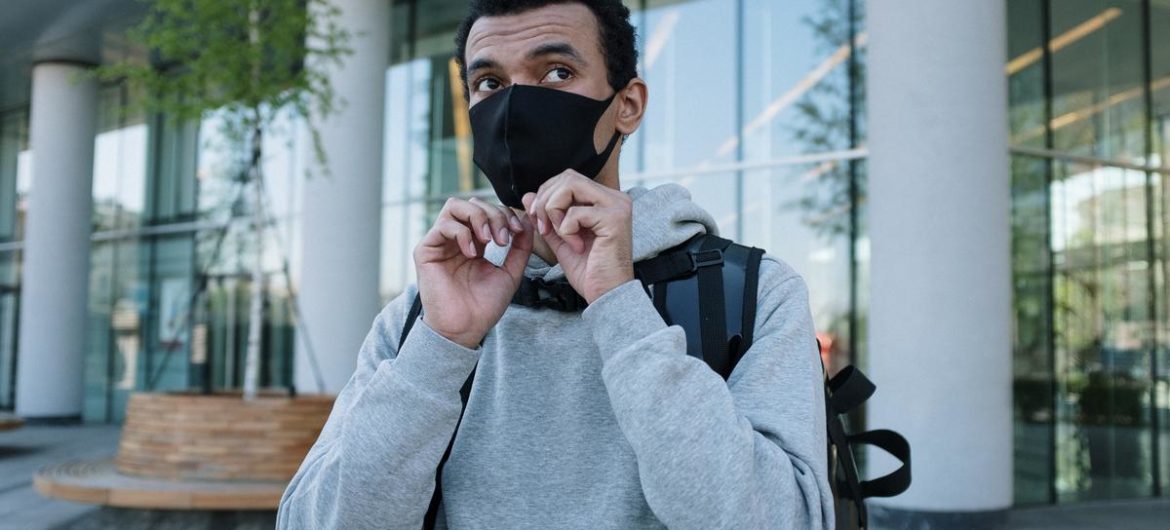0Campaigners have warned that disposable face masks are the ‘latest menace’ in the fight against plastic pollution.
Environmental charity Greenpeace is urging people to opt for reusable masks rather than throwaway items of PPE, as face coverings become mandatory in shops in England today.
Plastic poses a huge danger to wildlife and nature, clogging up habitats and often entangling animals.
Scientists have found that a suitable cloth covering which can be repeatedly washed and reworn is just as effective as a disposable mask at containing saliva droplets that may contain coronavirus.
Waste from masks also reach the seas, where they degrade into microplastics which can contaminate the environment and food chains, Greenpeace said.
The environmental group pointed to a study by University College London that calculated if every person in the UK wore a disposable mask a day for a year, it would create 66,000 tonnes of contaminated waste and 55,000 tonnes of plastic packaging.
A study published yesterday found microplastics and man-made fibres from disposable face masks in the guts of sharks off the Cornish coast.
More than two thirds of four species of seabed-dwelling sharks contained microplastics and other man-made fibres in their stomachs, they found.
Synthetic cellulose, one of the fibres that was collected, is widely used to make clothes and disposable hygiene products such as facemasks.
Widely-available face masks feature a layer of non-woven bonded fabric – commonly made of polypropylene – which gives them a long afterlife when they are discarded and can end up in landfill or oceans.
Professor Mark Miodownik from UCL said: ‘For general public use, reusable fabric masks are effective and far preferable to single-use plastic masks.
‘They reduce the environmental and health risks associated with the disposal of 66,000 tonnes of contaminated plastic waste that will be produced if everyone in the UK starts wearing single-use plastic masks.’
Louise Edge, senior campaigner at Greenpeace, said: ‘Throwaway masks are the latest plastic menace to be found strewn across parks and pavements.
‘They find their way into our waterways, clogging up our rivers and seas and degrading into harmful microplastics.
‘But disposable masks are not inherently safer for general public use than reusable ones, and experts say reusable masks can protect us during the pandemic, if worn and washed properly.’
Separate research from financial experts at Money.co.uk found there are clear fiscal benefits to the public.
Their analysis found that disposable masks would cost every person in the UK around £189.80 (R4020) a year if following proper guidelines and protocols.
This would collectively cost Britons over £12 billion (R253 billion) in just 12 months.
In comparison, using a reusable mask would cost £4 (R85) per year, leading to a yearly saving of £185.80 (R4020), they claim.
Environment minister Rebecca Pow said: ‘Littering blights our communities and cleaning it up costs taxpayers’ money, which is why it’s vital we all dispose of our waste – including used items of PPE – in the correct manner.
‘We know this public health emergency has meant an unavoidable reliance on single-use plastics such as PPE.
‘As we emerge from the pandemic, it’s clear we must pick up from where we left off and continue to lead the global fight on unnecessary single-use plastics.’
Governments and the World Health Organization advise people to make their own cloth face coverings in the hope surgical masks will be reserved for health workers.
New research published in the journal Thorax found home-made face coverings need to be at least two layers and preferably three to curb the spread of Covid-19, and surgical disposable masks offer the best protection of all.
The public are advised by the Government to wash their hands before putting a covering or mask on or taking it off, and to avoid touching their eyes, nose, or mouth while wearing one.
Face coverings should be stored in a plastic bag until they can be washed or disposed of, the Department of Health said.




